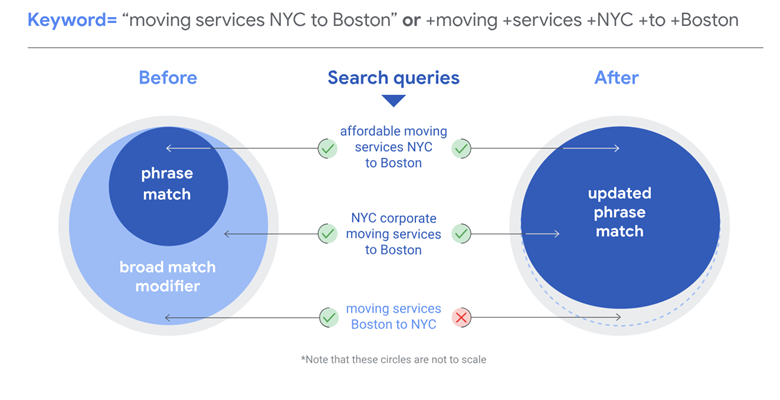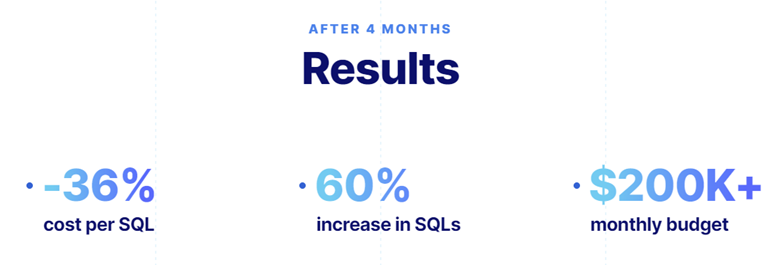Google has modified the functionality of their keyword match types, influencing the strategies employed by advertisers in their utilisation of Google Shopping. According to Google, these adjustments are aimed at enhancing the accessibility for customers to locate the specific products and services they seek.
Within this advertising landscape, understanding and effectively utilising various keyword-matching options is essential to achieving a successful advertising strategy. Until 2021, the Broad Match Modifier (BMM) was a key player, offering a strategic balance between target market reach and precision. Unfortunately, this BMM tool is no longer available. We will get into the changes and transformations further in the article.
Let’s dive in and explore the benefits and check out some strategic insights from a real-life case study involving Eskimoz and Matterport.
Understanding the Dynamics: Broad Match vs. Phrase Match vs Exact
Broad Match:
Broad match is a versatile keyword-matching type that allows your ads to be displayed on searches related to your specified keywords. It includes searches that may not directly match the exact meaning of your keywords, offering a comprehensive reach. This match type is the default setting for all keywords. The syntax for broad match is simple – input the keyword directly. To enhance relevancy, Broad Match considers factors such as the user’s recent search activities, landing page content, and other keywords within the ad group to understand the intent behind the keywords better. It is recommended to use Smart Bidding with broad match to optimise bids based on unique contextual signals for each search query.
Tips: Avoid adding very similar keywords, as only one of them will match a particular search, determined by the higher Ad Rank. Smart Bidding is crucial for adapting bids to the diverse nature of broad match queries.
Phrase Match:
Phrase match is a refined keyword-matching type that displays ads on searches that include the meaning of the specified keyword. The keyword’s meaning can be implied, and user searches may represent a more specific form of that meaning. With phrase match, you can reach a balance between the specificity of the exact match and the broad reach of the broad match. To use phrase match, enclose the keyword in quotes (e.g., “tennis shoes”). This ensures your ads are shown on searches that incorporate the intended meaning of the keyword.
Tips: Phrase match allows for a more targeted approach than a broad match but offers a broader reach compared to an exact match. This makes it a valuable choice when you want to capture a specific audience without limiting your ad’s exposure.

Exact Match:
Exact match is a precise keyword matching type that displays ads only on searches with the same meaning or intent as the specified keyword. While it provides the most control over ad visibility, it reaches fewer searches compared to phrase and broad match. To use exact match, enclose the keyword in square brackets (e.g., [red shoe]). This sadly does not always ensure that your ads are triggered only by searches that perfectly match the specified keyword, but it is the closest we can get without the addition of scripts.
Tips: Exact match is ideal when you want a high level of control over ad targeting and are willing to sacrifice some reach for increased relevance. Use exact match when targeting specific, well-defined audiences with clear intent.
Benefits of the Broad Match Modifier
But what about the forgotten fourth match type, BMM. This wasn’t just “another tool” in your SEM arsenal – it was an underutilised hack to level up your Google Ads game.
Increased Visibility:
Using the BMM was like turning on a spotlight for your ads. By allowing them to appear for close variants of your broad match keywords, you were capable of appearing for any term that contained all of the words for each keyword, but their order and what is between them wouldn’t affect your performance. This is when a phrase is quite a niche, as the words have to appear in the same order, so this becomes a great in-between solution.
Finding New Relevant Terms:
Flexibility was the name of the game with this tool. It helped to unearth terms that align seamlessly with your business objectives and helped to refine your advertising strategy along the way. It wasn’t just about finding new terms; it was about discovering untapped potential in the digital landscape.
Finding a New Broader Audience:
Effective advertising isn’t just about speaking to your existing audience – it’s about expanding that audience and thinking outside the box. The Broad Match tool helped to do this by capturing the attention of users searching for terms closely related to your offerings. Therefore, you are not just focusing on increasing brand awareness; you’re creating opportunities for engagement. With the BMM, it’s not just about reaching an audience; it’s about captivating them.
Broad Match Modifier: Matterport Case Study
The theory is great, but let’s take a look into the real-world application of the Broad Match Modifier. Our stars for this case study are Eskimoz, a Google ads agency, and Matterport, a master in 3D virtual tours and spatial data.

Eskimoz used the Broad Match Modifier tool to enhance Matterport’s Google Ads campaign. By incorporating BMM keywords like +virtual +tours +real +estate AND +3D +mapping +property” the results were pretty amazing.
How to Use the Broad Match Modifier in Google Ads
Leveraging the Broad Match Modifier wasn’t a one-time set-and-forget tactic; it was an ongoing task that demanded strategic planning and continuous optimisation. Here are three effective tips to get the most out of this:
1. Utilise Negative Keywords:
Incorporate negative keywords strategically by filtering out irrelevant searches, ensuring your ads are displayed to the most relevant audience. Remember, it’s not just about inclusion; it’s about refining the composition.
2. Regularly Monitor and Adjust:
In the evolving world of online advertising, regular monitoring is your tuning session. It’s your chance to identify what’s working and adjust your strategy accordingly. Try your best to engage in continuous adjustment and refinement.
3. Test and Experiment:
Experiment with different BMM keywords, find the rhythm that resonates with your audience and refine your composition. The key here isn’t to play safe, it’s about pushing boundaries and discovering new opportunities through your keyword experiments.
Important update to Broad Match Modifier
The changes to the Broad Match Modifier (BMM) in Google Ads, initiated in February 2021, represent a significant evolution in keyword match types. The integration involved merging the behaviours of BMM into the existing Phrase Match category. As a result, by July 2021, both Phrase Match and BMM keywords were updated with phrase-matching behaviour across all languages.
This transformation means that the standalone Broad Match Modifier is no longer a distinct match type. Instead, it has been replaced by what is now referred to as an “updated phrase match.”
This integration was done to simplify and streamline the keyword targeting options within Google Ads, providing advertisers with a more cohesive and consistent approach to phrase matching.
Advertisers, therefore, need to adapt their strategies to align with this change. The updated phrase match retains the expanded behaviours that were characteristic of BMM, offering a broader reach while maintaining relevance.
Final thoughts: Admiring the power of the Broad Match Modifier
Let’s wrap up by acknowledging the transformative potential of the Broad Match Modifier. Although this particular tool doesn’t exist anymore, it’s interesting to consider how it was used to help you reach your target audience and how you can use this in the form of updated phrase matches to explore your keyword possibilities.
FAQs about Using the Broad Match Modifier in Google Ads
What is the Broad Match Modifier (BMM) in Google Ads, and how does it differ from other keyword match types?
Answer: The Broad Match Modifier (BMM) in Google Ads is a keyword match type that balances reach and precision by allowing ads to appear for close variations of specified keywords. Unlike Broad Match (wide net) and Phrase Match (specific), BMM offers flexibility in targeting.
How can the Broad Match Modifier benefit my Google Ads campaign, and what strategic considerations should I keep in mind?
Answer: BMM provides increased visibility, discovers new relevant terms, and reaches a broader audience. Incorporate negative keywords strategically, regularly monitor and adjust your strategy, and experiment with different BMM keywords to refine your approach.
With the changes to Broad Match Modifier in 2021, how should advertisers adapt their strategies, and what is the role of updated phrase match?
Answer: Following the 2021 integration, the standalone BMM is replaced by an updated phrase match. Advertisers should transition and leverage the new capabilities of updated phrase matches for consistent phrase-matching behaviour across all languages. This adaptation ensures effective keyword exploration and audience targeting.












